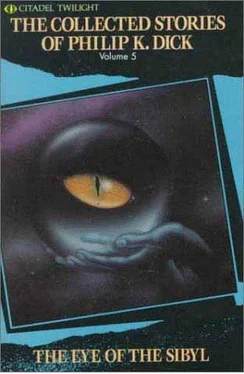He sold (another man made them) small electronic traps. Vermin had mutated and now could avoid or repel the ordinary passive trap, no matter how complicated. The cats in particular had become different, and Mr. Hardy built a superior cat trap, even better than his rat and dog traps. The vermin were dangerous; they killed and ate small children almost at will—or at least so one heard. And of course wherever possible they themselves were caught and eaten in return. Dogs in particular, if stuffed with rice, were considered delicious; the little local Berkeley newspaper which came out once a week had recipes for dog soup, dog stew, even dog pudding.
Meditating about dog pudding made Stuart realize how hungry he was. It seemed to him that he had not stopped being hungry since the first bomb fell; his last really adequate meal had been the lunch at Fred’s Fine Foods that day he had run into Hoppy Harrington the phocomelus doing his phony vision act. And where, he wondered suddenly, was that little phoce now? He hadn’t thought of him in years.
Now, of course, one saw many phoces, and almost all of them on their ‘mobiles, exactly as Hoppy had been, placed dead center each in his own little universe, like an armless, legless god. The sight still repelled Stuart, but there were so many repellent sights these days…
On the surface of the Bay to his right a legless veteran propelled himself out onto the water aboard a raft, rowing himself toward a pile of debris that was undoubtedly a sunken ship. On the hulk a number of fishing lines could be seen; they belonged to the veteran and he was in the process of checking them. Watching the raft go, Stuart wondered if it could reach the San Francisco side. He could offer the man fifty cents for a one-way trip; why not? Stuart got out of his car and walked to the edge of the pier.
“Hey,” he yelled, “come here.” From his pocket he got a penny; he tossed it down onto the pier and the veteran saw it, heard it. At once he spun the raft about and came paddling rapidly back, straining to make speed, his face streaked with perspiration. He grinned up friendlily at Stuart, cupping his ear.
“Fish?” he called. “I don’t have any yet today, but maybe later on how about a small shark? Guaranteed safe.” He held up the battered Geiger counter which he had connected to his waist by a length of rope—in case it fell from the raft or someone tried to steal it, Stuart realized.
“No,” Stuart said, squatting down at the edge of the pier. “I want to get over to San Francisco; I’ll pay you a quarter for one way.”
“But I got to leave my lines to do that,” the veteran said, his smile fading. “I got to collect them all or somebody’d steal them while I was gone.”
“Thirty-five cents,” Stuart said.
In the end they agreed, at a price of forty cents. Stuart locked the legs of Edward Prince of Wales together so no one could steal him, and presently he was out on the Bay, bobbing up and down aboard the veteran’s raft, being rowed across to San Francisco.
“What field are you in?” the veteran asked him. “You’re not a tax collector, are you?” He eyed him calmly.
“Naw,” Stuart said. “I’m a small trap man.”
“Listen, my friend,” the veteran said, “I got a pet rat lives under the pilings with me? He’s smart; he can play the flute. I’m not putting you under an illusion, it’s true. I made a little wooden flute and he plays it, through his nose… it’s practically an Asiatic nose-flute like they have in India. Well, I did have him, but the other day he got run over. I saw the whole thing happen; I couldn’t go get him or nothing. He ran across the pier to get something, maybe a piece of cloth… he has this bed I made him but he gets—I mean he got—cold all the time because they mutated, this particular line, they lost their hair.”
“I’ve seen those,” Stuart said, thinking how well the hairless brown rat evaded even Mr. Hardy’s electronic vermin traps. “Actually I believe what you said,” he said. “I know rats pretty well. But they’re nothing compared to those little striped gray-brown tabby cats… I’ll bet you had to make the flute, he couldn’t construct it himself.”
“True,” the veteran said. “But he was an artist. You ought to have heard him play; I used to get a crowd at night, after we were finished with the fishing. I tried to teach him the Bach ‘Chaconne in D.’ ”
“I caught one of those tabby cats once,” Stuart said, “that I kept for a month until it escaped. It could make little sharp-pointed things out of tin can lids. It bent them or something; I never did see how it did it, but they were wicked.”
The veteran, rowing, said, “What’s it like south of San Francisco these days? I can’t come up on land.” He indicated the lower part of his body. “I stay on the raft. There’s a little trap door, when I have to go to the bathroom. What I need is to find a dead phoce sometime and get his cart. They call them phocomobiles.”
“I knew the first phoce,” Stuart said, “before the war. He was brilliant; he could repair anything.” He lit up an imitation-tobacco cigarette; the veteran gaped at it longingly. “South of San Francisco it’s as you know all flat. So it got hit bad and it’s just farmland now. Nobody ever rebuilt there, and it was mostly those little tract houses so they left hardly any decent basements. They grow peas and corn and beans down there. What I’m going to see is a big rocket a farmer just found; I need relays and tubes and other electronic gear for Mr. Hardy’s traps.” He paused. “You ought to have a Hardy trap.”
“Why? I live on fish, and why should I hate rats? I like them.”
“I like them, too,” Stuart said, “but you have to be practical; you have to look to the future. Someday America may be taken over by rats if we aren’t wary. We owe it to our country to catch and kill rats, especially the wiser ones that would be natural leaders.”
The veteran glared at him. “Sales talk, that’s all.”
“I’m sincere.”
“That’s what I have against salesmen; they believe their own lies. You know that the best rats can ever do, in a million years of evolution, is maybe be useful as servants to we human beings. They could carry messages maybe and do a little manual work. But dangerous—” He shook his head. “How much does one of your traps sell for?”
“Ten dollars silver. No State boodle accepted; Mr. Hardy is an old man and you know how old people are, he doesn’t consider boodle to be real money.” Stuart laughed.
“Let me tell you about a rat I once saw that did a heroic deed,” the veteran began, but Stuart cut him off.
“I have my own opinions,” Stuart said. “There’s no use arguing about it.” They were both silent, then. Stuart enjoyed the sight of the Bay on all sides; the veteran rowed. It was a nice day, and as they bobbed along toward San Francisco, Stuart thought of the electronic parts he might be bringing back to Mr. Hardy and the factory on San Pablo Avenue, near the ruins of what had once been the west end of the University of California.
“What kind of cigarette is that?” the veteran asked presently.
“This?” Stuart examined the butt; he was almost ready to put it out and stick it away in the metal box in his pocket. The box was full of butts, which would be opened and made into new cigarettes by Tom Grandi, the local cigarette man in South Berkeley. “This,” he said, “is imported. From Marin County. It’s a deluxe Gold Label made by—” He paused for effect. “I guess I don’t have to tell you.”
“By Andrew Gill,” the veteran said. “Say, I’d like to buy a whole one from you; I’ll pay you a dime.”
“They’re worth fifteen cents apiece,” Stuart said. “They have to come all the way around Black Point and Sears’ Point and along the Lucas Valley Road, from beyond Nicasio somewhere.”
Читать дальше









